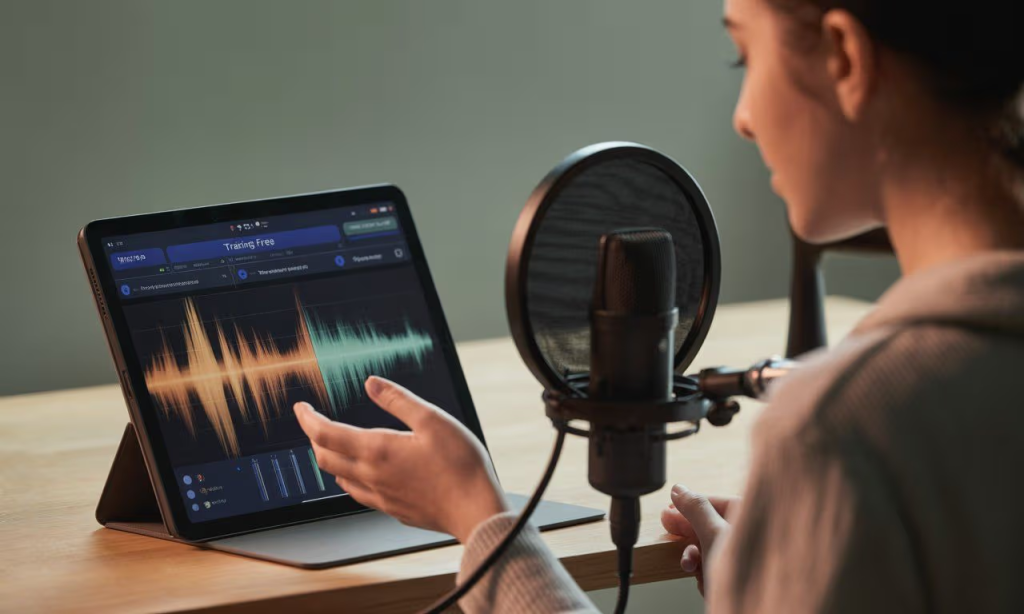
In today’s digital landscape, creativity and technology work hand in hand. From music producers to podcast hosts, artists are discovering new ways to enhance their workflow — and one of the most transformative tools in this space is AI transcription. The ability to turn music to text or voice to text has opened a world of convenience, accuracy, and accessibility that was once unimaginable. By using tools that transcribe with ai, creators can now focus more on their art and less on repetitive manual tasks.
AI: The Bridge Between Sound and Text
The foundation of AI-powered transcription lies in its ability to listen, understand, and accurately convert sounds into words or notations. Whether it’s a musician trying to capture melodies or a podcaster documenting conversations, AI makes this process effortless. Traditional manual transcription was not only time-consuming but also prone to human error. With modern voice to text transcriber tools, every lyric, note, and spoken phrase is instantly captured in written form.
This has completely changed how creative professionals approach documentation and editing. Instead of spending hours replaying recordings, they can transcribe ai within minutes, allowing for instant review and creative refinement.
Transforming Music Creation with AI Transcription
For musicians, inspiration can strike anywhere — during a jam session, while traveling, or in the middle of the night. Losing that creative spark due to poor documentation is now a thing of the past. AI tools that convert music to text help capture the essence of musical ideas in real time.
These systems analyze melodies, harmonies, and rhythms, translating them into readable and editable formats. This is especially valuable for composers who want to notate pieces without the need to manually write sheet music. For example:
- Songwriters can quickly convert sung lyrics into text for refining later.
- Producers can analyze vocal patterns or instrumental layers more precisely.
- Bands can share transcribed sessions across members to collaborate remotely.
Such tools help streamline music production, bridge gaps between creativity and documentation, and even assist in copyright or licensing processes by maintaining accurate lyric and composition records.
A Podcaster’s Secret Weapon
For podcasters, transcription has become essential for both productivity and accessibility. Every episode involves multiple layers — interviews, background conversations, and editing cues — all of which benefit from being converted into text. Using transcribe with ai, podcasters can easily generate accurate scripts and searchable archives of their content.
This allows for:
- Efficient editing: Editors can skim through text versions of recordings to find specific sound bites.
- Improved SEO and discoverability: Transcripts can be published on websites, helping episodes rank higher on search engines.
- Accessibility: Providing written transcripts ensures that hearing-impaired audiences can engage with podcast content equally.
Moreover, AI tools now integrate seamlessly with editing platforms, allowing podcasters to edit audio by simply editing the text. If a line needs to be cut, they delete it from the transcript — and the corresponding audio disappears automatically.
Empowering Collaboration and Accessibility
The ability to convert voice to text goes beyond convenience — it’s a powerful step toward inclusivity. For musicians, it means their lyrics or compositions can be easily shared with producers or co-writers in a universal format. For podcasters, it means reaching broader audiences through text-based accessibility.
With transcribe ai, teams working remotely can share creative content across platforms, annotate text collaboratively, and instantly translate scripts or lyrics into multiple languages. This not only strengthens collaboration but also helps bridge cultural gaps in global music and podcasting communities.
The Creative Freedom AI Brings
Perhaps the most remarkable benefit of using a transcription service online is the creative freedom it offers. By automating the mundane task of transcription, artists and creators reclaim valuable time to focus on innovation. A producer can spend more hours mixing sounds instead of typing lyrics, and a podcaster can focus on storytelling instead of editing every second of dialogue manually.
AI transcription also encourages experimentation. For example, creators can analyze spoken patterns to improve delivery, or study lyrical structures for artistic evolution. When paired with machine learning tools, transcription data can even generate creative insights — identifying themes, tone variations, and emotional depth across recordings.
Beyond Words: The Future of Audio Intelligence
As AI transcription continues to evolve, the technology is becoming more than just a conversion tool. Advanced models are now capable of detecting emotions, separating background noise, and even identifying speakers — giving creators deeper control over their content.
In music, these features can highlight instrument layers or track subtle nuances in performance. In podcasting, they help ensure smoother editing, better sound clarity, and accurate attributions for multiple speakers. Future AI tools could even assist in composing or remixing based on transcribed data, merging creativity with computation in unprecedented ways.
Final Thoughts: A Smarter Way to Create
Musicians and podcasters share a common goal — to communicate ideas through sound. AI transcription helps them do that more efficiently, accurately, and inclusively. Whether it’s capturing a fleeting melody or archiving a powerful interview, the ability to transcribe with ai has become a vital part of the modern creative toolkit.
As technology continues to evolve, AI-powered transcription will not only make content creation faster but also more connected and accessible for everyone. For artists and storytellers who rely on rhythm, tone, and dialogue, embracing transcribe ai means embracing a smarter, more collaborative way to create and share their voice with the world.
